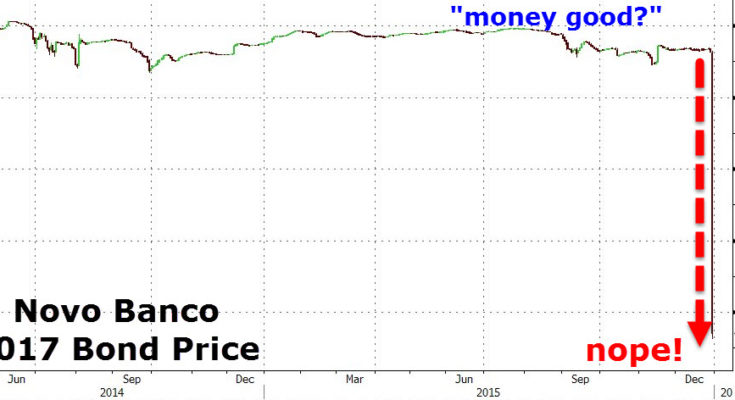Last December 30, creditors in Portugal’s Novo Banco received a very unpleasant parting present to 2015: a bail-in, which sent their bonds crashing from just shy of par to barely above worthless.
(Click on image to enlarge)

As a reminder, Novo Banco was the “good†bank forged from the ashes of Banco Espirito Santo which had to be bailed out by the state in August of 2014. The idea was to sell Novo Banco to pay for the cost of the bailout, but the auction process eventually floundered amid turmoil in Chinese markets (at least two of the potential bidders were Chinese) and uncertainty about whether this “good†bank would in fact need more capital given the elevated level of NPLs already on its books.
Then last November, the ECB told Novo it would need to raise some €1.4 billion in fresh capital which the bank initially said would come from asset sales. A little over a month later, Portugal’s central bank essentially just gave up. On December 29, the bank announced it was transferring €2 billion in NB senior notes back to Banco Espirito Santo which, like a ghost skyscraper in China, is set for demolition. In other words, Novo Banco plugged the €1.4 billion hole by essentially declaring €2 billion in bonds null and void.
Fast forward six months later, and Novo Banco is set to be the gift that keeps on giving… even more terrible news.
According to the FT, Portuguese banks, already undercapitalised and loaded with bad debt, are bracing for even more heavy losses from Lisbon’s so far unsuccessful attempts to sell Novo Banco.
Estimates of the potential bill facing banks, which finance the resolution fund that bailed out Novo Banco in 2014, range from €2.9bn to €3.9bn. Some bankers are even doubtful that the rescued lender will attract any acceptable offers, leading to its possible break-up or liquidation.
Maybe. Or maybe we we will the first case of a “bad bank squared” – it would be hardly surprising considering Italy is about to bail out its already repeatedly bailed out banking sector… again.

